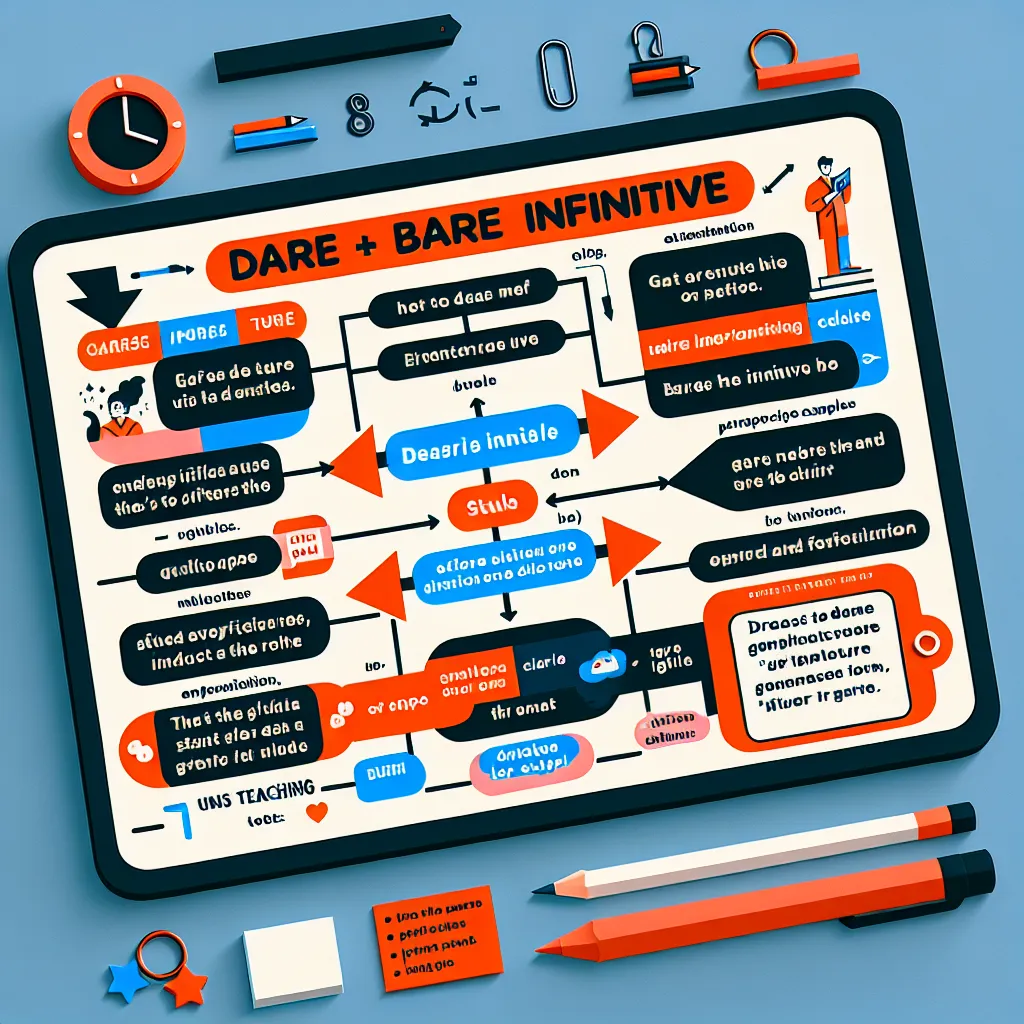“Dare + bare infinitive” is a unique grammatical structure that can significantly enhance your IELTS score when used correctly. This construction is particularly valuable in the Speaking and Writing sections, where showcasing advanced language skills is crucial. Let’s delve into the intricacies of this structure and explore how to effectively utilize it in your IELTS exam.
Understanding “Dare + Bare Infinitive”
The structure “dare + bare infinitive” is a semi-modal verb construction that expresses a challenge or provocation. It’s often used to convey a sense of bravery, audacity, or sometimes criticism.

Grammar Formula
The basic formula for this structure is:
Dare + [subject] + [bare infinitive]
It’s crucial to note that the bare infinitive is used without ‘to’. This distinguishes it from many other verb structures in English.
Examples in IELTS Context
- “How dare you suggest that environmental policies are unnecessary!” (Speaking Part 3)
- “The politician dared criticize the new legislation without fully understanding it.” (Writing Task 2)
- “I dare say that the economic impact will be significant.” (Speaking Part 2)
- “Nobody dares speak against the company’s unethical practices.” (Writing Task 1)
- “She dared not mention the incident during the interview.” (Speaking Part 3)
In each of these examples, ‘dare’ is followed directly by the bare infinitive form of the verb, without ‘to’.
Usage in IELTS Speaking
In the IELTS Speaking test, using “dare + bare infinitive” can demonstrate a high level of language proficiency. It’s particularly effective in Part 3, where more complex discussions take place.
Sample Answer (Speaking Part 3)
Question: “How do you think social media affects political discourse?”
Answer: “Social media has undoubtedly transformed political communication. I dare say it has both positive and negative impacts. On one hand, it provides a platform for diverse voices, allowing ordinary citizens to engage in political debates. However, it also creates echo chambers where misinformation can spread rapidly. How dare anyone claim that social media hasn’t significantly altered the political landscape? It’s a double-edged sword that dares challenge traditional media’s monopoly on information dissemination.”
In this response, the speaker uses “dare + bare infinitive” three times, showcasing a sophisticated command of English.
Application in IELTS Writing
For Writing Task 2, incorporating “dare + bare infinitive” can elevate your essay’s language quality, potentially boosting your score in the Lexical Resource and Grammatical Range criteria.
Sample Paragraph (Writing Task 2)
Topic: The impact of technology on interpersonal relationships
“The pervasive influence of technology on human interactions is undeniable. I dare say that smartphones and social media have fundamentally altered the way we form and maintain relationships. While some dare argue that these tools enhance connectivity, one must question the depth of these digital connections. How dare we assume that a ‘like’ or a quick message equates to meaningful communication? It’s a complex issue that dares challenge our traditional notions of interpersonal bonds.”
This paragraph effectively uses the structure four times, demonstrating a high level of grammatical sophistication.
Achieving Higher Band Scores
To achieve higher band scores (7+) in IELTS, it’s crucial to use complex structures like “dare + bare infinitive” accurately and appropriately. Compare these examples:
Band 6: “People shouldn’t say that technology is bad for relationships.”
Band 8: “How dare anyone claim that technology is inherently detrimental to relationships without considering its nuanced impacts.”
The Band 8 example showcases a more sophisticated use of language, employing the “dare + bare infinitive” structure effectively.
Common Mistakes to Avoid
-
Adding ‘to’ after ‘dare’:
Incorrect: “How dare you to speak to me like that?”
Correct: “How dare you speak to me like that?” -
Using the wrong verb form:
Incorrect: “She dared spoke against the policy.”
Correct: “She dared speak against the policy.” -
Overusing the structure:
While it’s impressive, using “dare + bare infinitive” too frequently can seem unnatural. Aim for once or twice in a speaking response or essay. -
Misunderstanding the tone:
“Dare” often implies a challenge or criticism. Be cautious not to use it in contexts where it might seem overly confrontational. -
Forgetting the question form:
In questions, ‘dare’ can be used as an auxiliary:
“Dare he say that in public?” is correct and more formal than “Does he dare to say that in public?”
Conclusion
Mastering the “dare + bare infinitive” structure can significantly enhance your IELTS performance. It demonstrates a high level of grammatical knowledge and can help you express complex ideas more eloquently. Practice incorporating this structure into your speaking and writing, but remember to use it judiciously and in appropriate contexts. As you prepare for your IELTS exam, challenge yourself to use this construction in practice essays and speaking exercises. Dare you aim for that perfect 9 band score?